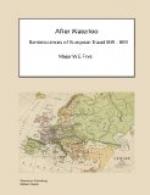Vigna era, vigna son; Era podada, or piu non son; E non so per qual cagion Non mi poda il mio patron.[103]
The husband, on reading these lines, wrote the following in answer:
Vigna eri, vigna sei; Eri podada, e piu non sei; Per la gran fa del Leon Non ti poda il tuo patron.
The lady on reading these lines perceived at once the cause of her husband’s estrangement and succeeded in explaining the matter satisfactorily to him, which was facilitated by the ingenuous declaration of Leon himself that he had tried to succeed but had been repulsed. The husband and wife being perfectly reconciled lived happily and no doubt the vine was cultivated as usual.
I left Florence the 27th November, and arrived at Turin 5th December. In an evil hour I engaged myself to accompany an old Swiss Baroness with whom I became acquainted at the Hotel of Mine Hembert to accompany her to Turin. She had with her her son, a fine boy of thirteen years of age but very much spoiled. We engaged a vetturino to conduct us to Turin, stopping one day at Milan. The Baroness did not speak Italian and generally sent for me to interpret for her when any disputes occurred between her and the people at the inns, and these disputes were tolerably frequent, as she always gave the servants wherever she stopped a good deal of trouble and on departing generally forgot to give them the buona grazia. I sometimes paid them for her myself in order to avoid noise and tumult; at other times we departed under vollies of abuse and imprecations such as brutta vecchia, maladetta carogna, and so forth. The Baroness had strong aristocratic prejudices and was a bitter enemy of the French Revolution to which she attributed collectively all the desagremens she had experienced during life and all the inconveniences she met with during our present journey. The negligence and impertinence of the servants in Italy were invariably attributed by her to the revolutionary principle and she told me that the servants in her native canton Bern were the best in the world, but that even in them the French Revolution had made a great deal of difference and that they were not so submissive as they used to be. As she sent for me to be her dragoman in all her disputes on the road, you may conceive how glad I was to arrive at Turin to be rid of her. She put me in mind of Gabrina in the Orlando Furioso. We stopped one day at Milan but we were very near being detained two or three days at Fiacenza owing to an informality in the Baroness’s passport, which had not been vise by the Austrian Legation at Florence. In vain she pleaded that she was told at the inn at Florence that such visa was not necessary; the police officer at the Austrian Douane, at a short distance beyond Piacenza, was inexorable and refused to viser her passport to allow her to proceed. She was in a sad dilemma and it was




